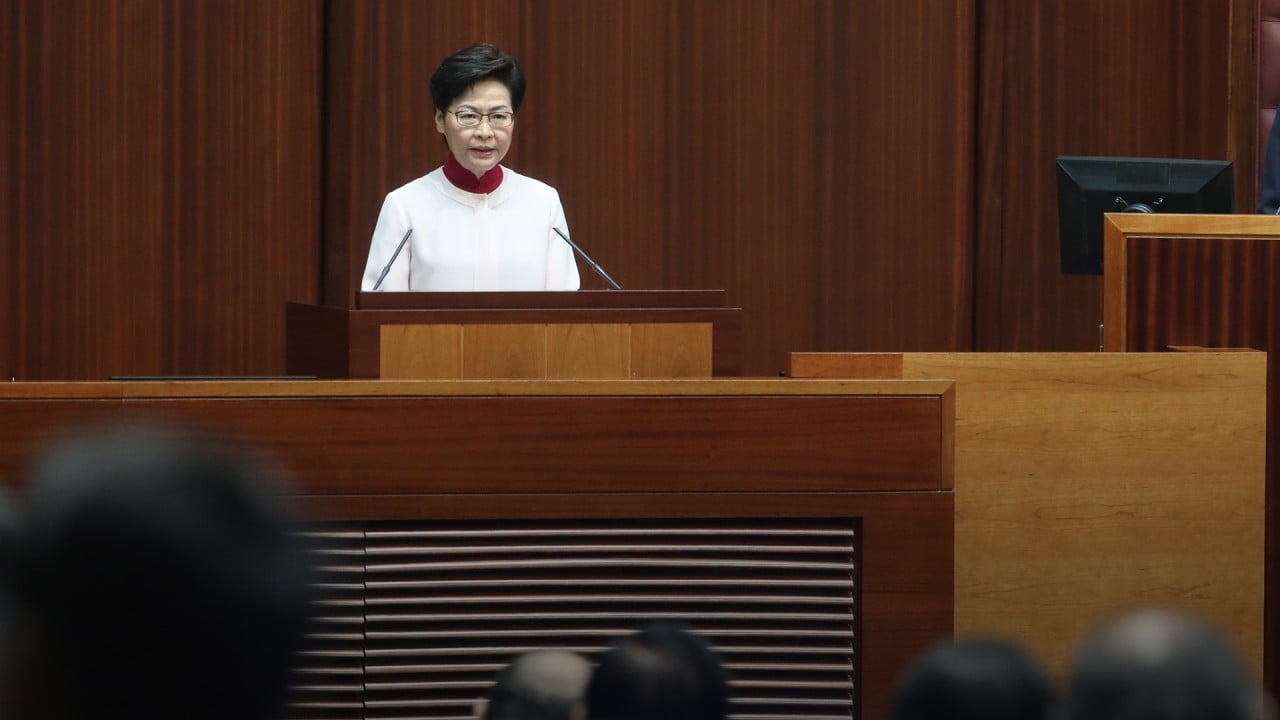
New law could ban insults against all Hong Kong civil servants, not just police, city leader says
- Chief Executive Carrie Lam says the legislation did not come up in her policy address because it requires further study as to its scope
- One pro-Beijing lawmaker has called for the law to ban insults not just against public servants, but literally anyone
Hong Kong’s national security work far from over, leader says
Various police unions have advocated outlawing such insults for years, but the calls were amplified in the wake of the anti-government protests of 2019. Demonstrators at the time frequently hurled expletives at frontline officers, while some police were seen throwing insults right back.
More recently, controversy has flared over a parody rap created by internet users that mocked the death of senior police inspector Lam Yuen-yee, who was killed late last month during an anti-smuggling operation at sea.
Lam on Thursday acknowledged police were often subject to harassment, but noted officers were not the only ones being targeted.
“It shouldn’t just be about the disciplined forces. So many food and environmental hygiene officers of ours have also faced insults on the front line. Our staff from the Lands Department are even met with physical clashes,” she said, noting that Singapore recently outlawed insults against security officers hired by private companies.
Lam added that she had yet to decide which secretary in her administration should spearhead the legislative process, which would depend on the eventual scope of the bill.

03:43
Hong Kong leader Carrie Lam gives last policy address of current term, ending on emotional note
“We will speed up the work on this front,” she said, pledging to offer an updated response in the next Legco term. “But I would like to stress that the law is just a means. The most important thing is to be self-disciplined.”
She was responding to a question by lawmaker Elizabeth Quat, of the Democratic Alliance for the Betterment and Progress of Hong Kong, who urged the government to introduce an even broader law banning insults against literally anyone, with particularly tough consequences for those offending government workers.
Emotional Hong Kong security chief blasts mockery of officer’s death at sea
Pointing to what she described as a trend of police being verbally abused, she said: “Even the police officers who died courageously in a mission or sustained injuries were met with cold-blooded comments.”
In addition to Senior Inspector Lam, a constable who was stabbed on July 1 was also treated disrespectfully. In some circles, sympathy was reserved for the attacker, who died after turning the knife on himself, with some people leaving flowers at the site of the stabbing.
Four student leaders from the University of Hong Kong were ultimately charged with advocating terrorism under the Beijing-imposed national security law over their involvement in a resolution a week after the attack expressing gratitude for the assailant and “deep sadness” at his death.

“This has undermined their dignity and authority, and made it difficult for them to carry out their duty,” Quat said.
Late last month, Secretary for Security Chris Tang Ping-keung raised the possibility of creating a new incitement offence targeting those who spread hatred against the Hong Kong government.
The offence, he said, could be included in a new security bill mandated under Article 23 of the city’s mini-constitution, the Basic Law, which is set to be revived by the government soon.
But Lo Kin-hei, chairman of the opposition Democratic Party, called the plans for legislation outlawing insults “unwise”.
“The government doesn’t try to earn the respect of its people. Instead, they just try to criminalise anyone who dislikes them and expresses themselves in a not-so-decent way,” he said.
Lingnan University terminates 2 professors who previously criticised government
Singapore and France have specific legislation dealing with insulting public officials, but Michael Davis, a resident fellow at the Woodrow Wilson International Centre in Washington, said in most places, hate speech was banned in a different context.
“These restrictions are usually targeted at speech that stirs hatred to ethnic groups that have been traditionally discriminated against,” he said. “It would be a huge stretch of such practice to use it to justify merely insulting language targeted at officials or their misbehaviour.”
Chinese University legal scholar Stuart Hargreaves noted the France and Singapore examples. “But they have quite different approaches than Hong Kong when it comes to constitutional rights including free expression,” he said.
New South Wales has an ‘offensive language’ penalty not related to public officers. But the Australian state does not have a bill of rights, Hargreaves said.
Britain criminalised “insulting” language in the past, but dropped it a few years ago out of concerns it conflicted too much with free expression, he added.
“Most common law jurisdictions with constitutional protections for free speech criminalise insulting speech only when it crosses the threshold into provoking breach of the peace. But that behaviour is already criminalised in Hong Kong,” Hargreaves, who specialises in constitutional law, said.
“If the government plans to introduce a new offence to criminalise lower-level insults that do not rise to breaching the peace or inciting others to breach the peace, they would need to show that it was a justified and proportionate restriction on speech.”

